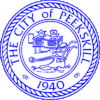
Back بيكسكيل Arabic بيكسكيل ARZ پیکسکیل، نیویورک AZB Пийкскил Bulgarian Peekskill Catalan Пикскилл (Нью-Йорк) CE Peekskill CEB Peekskill, Efrog Newydd Welsh Peekskill DAG Peekskill German
Peekskill, New York | |
|---|---|
| City of Peekskill | |
 Downtown Peekskill | |
 Location in Westchester County and New York | |
 Interactive map of Peekskill | |
| Coordinates: 41°17′N 73°55′W / 41.283°N 73.917°W | |
| Country | |
| State | |
| County | Westchester |
| Incorporated (village) | 1816 |
| Incorporated (city) | 1940 |
| Government | |
| • Type | Council-Manager |
| • Mayor | Vivian C. McKenzie (D) |
| • City Manager | Matthew Alexander |
| • Common Council | Members' List |
| Area | |
| • Total | 5.57 sq mi (14.43 km2) |
| • Land | 4.34 sq mi (11.25 km2) |
| • Water | 1.23 sq mi (3.18 km2) |
| Elevation | 128 ft (39 m) |
| Population (2020) | |
| • Total | 25,431 |
| • Density | 5,854.28/sq mi (2,260.30/km2) |
| Time zone | UTC-5 (Eastern (EST)) |
| • Summer (DST) | UTC-4 (EDT) |
| ZIP Code | 10566 |
| Area code | 914 |
| FIPS code | 36-56979 |
| GNIS feature ID | 0960097 |
| Website | www |
Peekskill is a city in northwestern Westchester County, New York, United States, 35 miles (56 km) north of New York City. Established as a village in 1816, it was incorporated as a city in 1940. It lies on a bay along the east side of the Hudson River, across from Jones Point in Rockland County. The population was 25,431 at the 2020 U.S. census, up from 23,583 at the 2010 census. It is the third-largest municipality in northern Westchester County, after Cortlandt and Yorktown.
The area was an early American industrial center, primarily for iron plow and stove products. The Binney & Smith Company, now named Crayola LLC and makers of Crayola products, is linked to the Peekskill Chemical Company founded by Joseph Binney at Annsville in 1864, and succeeded by a partnership by his son Edwin and nephew Harold Smith in 1885.
The well-publicized Peekskill Riots of 1949 involved attacks and a lynching-in-effigy occasioned by Paul Robeson's benefit concerts for the Civil Rights Congress, although the main assault following the September concert properly took place in nearby Van Cortlandtville. Nevertheless, the city of Peekskill has since had multiple African American mayors since 1984.[2][3][4][5]
- ^ "ArcGIS REST Services Directory". United States Census Bureau. Retrieved September 20, 2022.
- ^ Williams, Lena (December 23, 1984). "Peekskill Mayor Looks to Growth". The New York Times. Retrieved May 21, 2022.
- ^ "Mayor Andre Rainey". City of Peekskill. Retrieved May 21, 2022.
- ^ Bailey, A. Peter (April 1985). "Richard E. Jackson: The New Man On Top In Peekskill". Ebony – via Google Books.
- ^ "Vivian McKenzie declares victory in Peekskill mayoral race". News 12 Brooklyn. November 2, 2021. Retrieved May 21, 2022.
